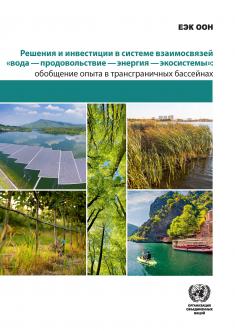How can governments, other public and private actors learn about and better understand the water-energy-food-ecosystems nexus?
How can they use a ‘nexus approach’ to address the most pressing issues in transboundary water basins?
Last but not least, how can they design and implement ‘nexus’ solutions and investments that create synergies and provide transboundary benefits?
The new publication ‘Solutions and investments in the water-food-energy-ecosystems nexus: A synthesis of experiences in transboundary basins’ addresses these questions and comes with five main messages:
- Since transboundary basins account for around 60 percent of global freshwater flows, their potential to generate benefits across water, food, energy, and ecosystems through integrated solutions and investments is enormous.
- Transboundary cooperation is crucial to make them possible and basin organizations have a crucial role to play in coordinating or catalysing nexus solutions and investments. They can facilitate the cross-sectoral dialogue needed to develop sustainable water infrastructure in shared basins.
- Tackling water and environment-related issues through nexus solutions in transboundary waters is possible and there are many lessons to be learned from around the world.
- Successful approaches require the understanding of inter-sectoral linkages as well as a dialogue process to jointly prioritize key issues and elaborate solutions.
- Important vehicles for ‘nexus’ solutions and investments include:
- cross-cutting regional strategies agreed by multiple governments,
- river basin plans developed jointly by riparian states,
- regionally coordinated financial support from financial institutions.
The publication offers policymakers and practitioners various case studies and an overview of the different challenges which nexus solutions help address in transboundary waters around the globe. It presents each case study in detail, which policy and other challenges were encountered during implementation, how they were addressed, and identifies crucial success factors. Many lessons learned from regional dialogues provide insights into upscaling nexus solutions in transboundary contexts, with a focus on financing and enabling environments.
This publication draws extensively on several Water-Food-Energy-Ecosystem Nexus Assessments carried out under the Convention on the Protection and Use of Transboundary Watercourses and International Lakes as well as the experience of key partners (e.g. the International Union for the Conservation of Nature, the Global Environment Facility, and the German Agency for International Development (GIZ) all of whom are working to promote transboundary and regional cooperation across sectors. The lessons learned from these dialogues are particularly relevant for the successful implementation of the Agenda 2030 for Sustainable Development, which requires strong cross-sectoral cooperation.
